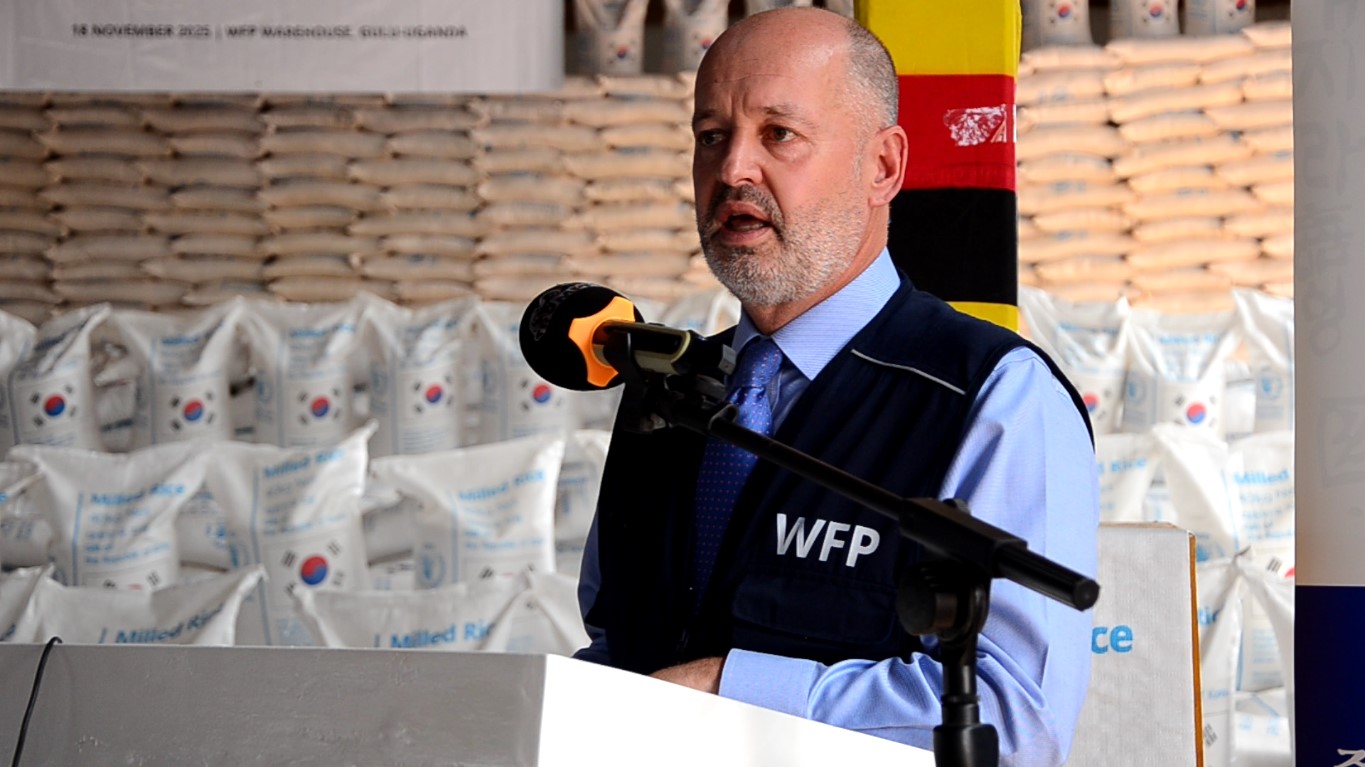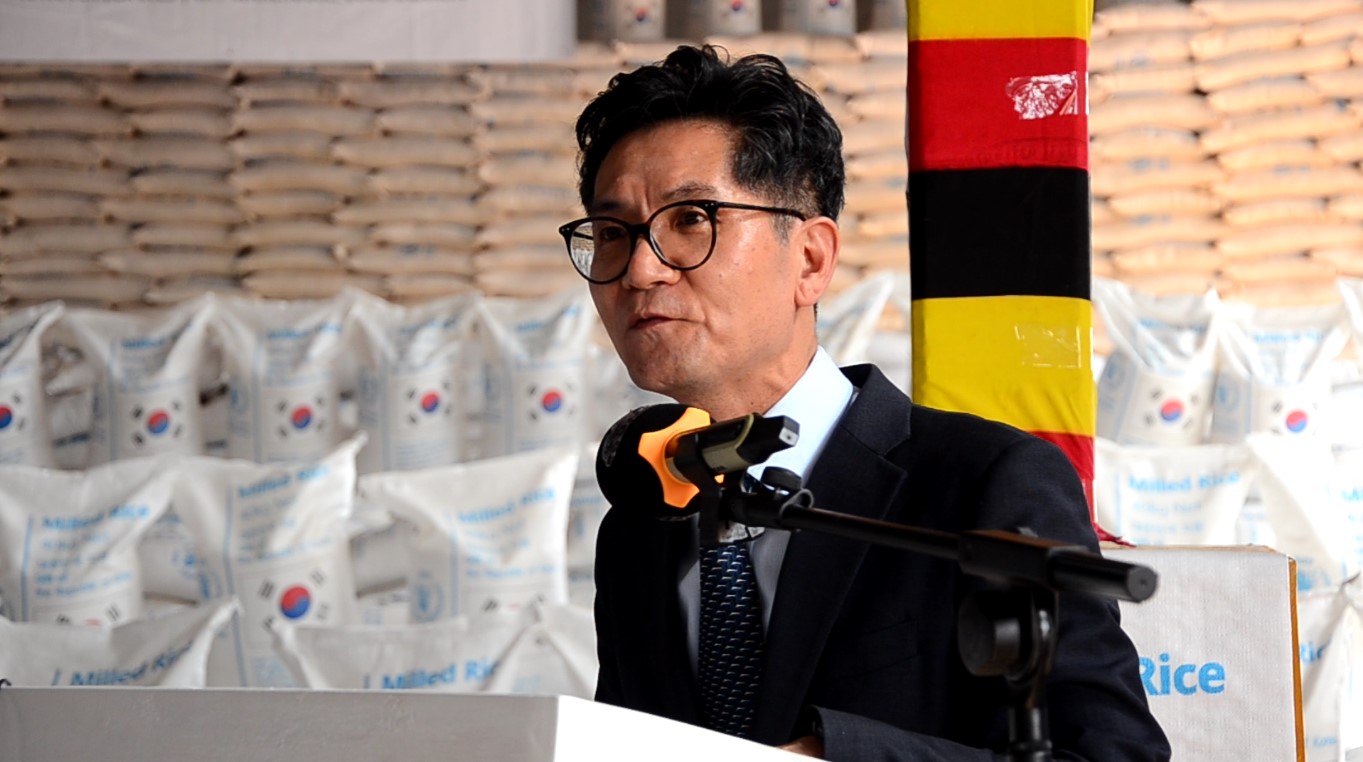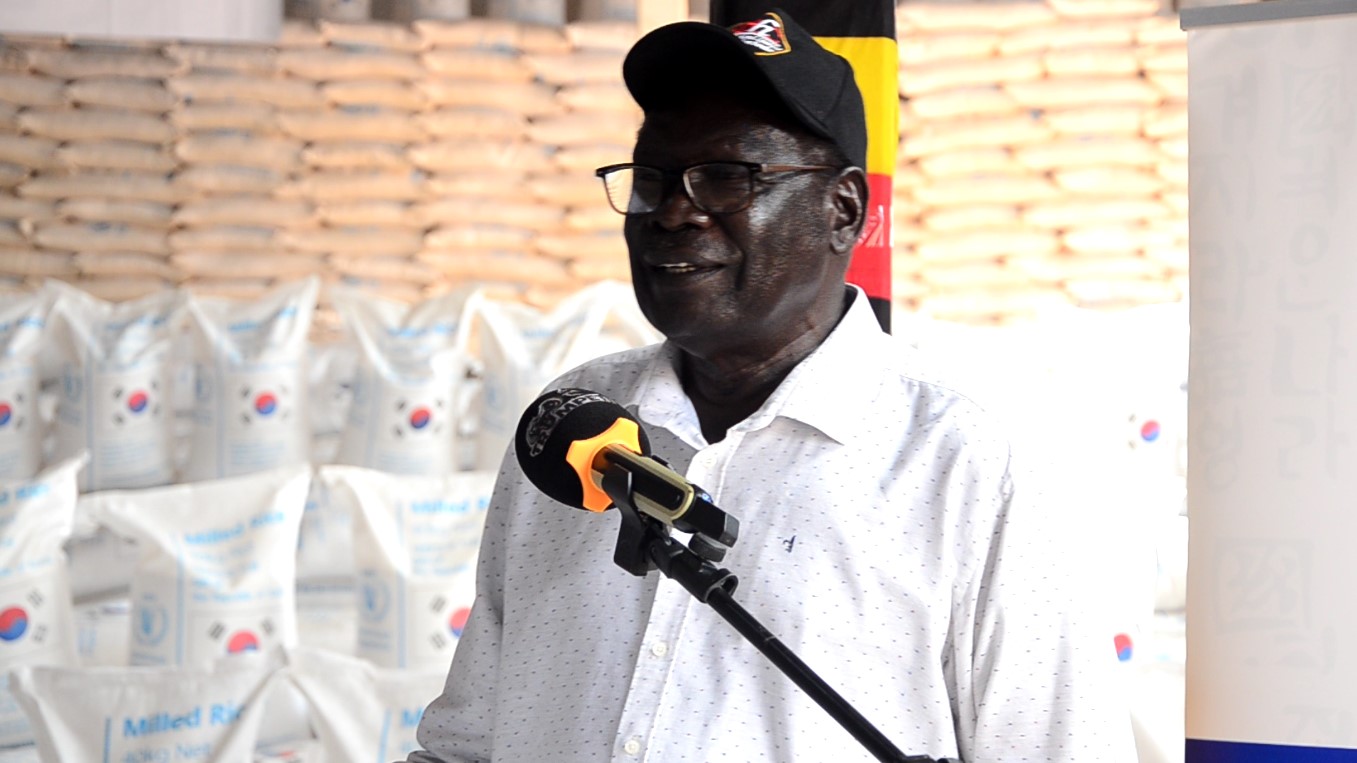Korea gives over 2,500 tonnes of rice to refugees, Karamoja's hungry
Uganda is home to over 1.9 million refugees, fleeing conflict and hardship in neighbouring countries, including South Sudan, DR Congo, Sudan, Somalia, Burundi, Ethiopia and Rwanda.
Korea's Ambassador to Uganda, Park Sung-Soo (Left), Hillary Onek, Minister of Disaster Preparedness and Refugees (Middle), and Marcus Prior, WFP Deputy Country Director to Uganda. (Courtesy)
_____________________________
The government of South Korea has donated 2,544 metric tonnes of rice, valued at nearly $3 million (about shillings one billion), to Uganda to support refugees and school feeding programmes in the Karamoja region.
The donation was formally handed over at the World Food Programme (WFP) stores in Gulu city on November 20, 2025, at a ceremony attended by Ugandan government officials, WFP representatives, and the South Korean Ambassador to Uganda, Park Sung-Soo. The donation is expected to reach over 600,000 refugees living in settlements across the country and 200,000 schoolchildren in Karamoja, providing a critical lifeline amid growing food insecurity.
WFP Uganda deputy country director Marcus Prior. (Courtesy)
According to WFP Uganda deputy country director Marcus Prior, much as Uganda has long been recognised for its generous refugee policy, limited resources have forced authorities to reduce monthly food assistance from 1.6 million beneficiaries to just 700,000 of the most vulnerable, leaving many families at risk of hunger. Even these recipients are receiving only about 60 per cent of their full food ration.
Uganda is home to over 1.9 million refugees, fleeing conflict and hardship in neighbouring countries, including South Sudan, DR Congo, Sudan, Somalia, Burundi, Ethiopia and Rwanda.
The state of hunger
Food insecurity is having serious consequences. WFP assessments reveal that families are skipping meals, malnutrition is rising, and children are dropping out of school. Karamoja, already grappling with chronic food insecurity, is particularly affected. Nearly 255,000 school children across 320 schools rely on WFP’s school feeding programmes in a region where one in four children suffers from chronic malnutrition.
The partnership between WFP in Uganda and South Korea stretches back five years, during which South Korea has contributed over 19,000 tonnes of rice to refugee operations in Uganda. Prior said Korea’s support has been “a lifeline,” particularly in 2025, a year marked by record global humanitarian needs and funding shortfalls, forcing aid agencies to make difficult decisions about who receives assistance.
“We have faced the worst storm in 2025. Global humanitarian needs have risen to record levels, and WFP and partners have been forced to make tough choices about who eats and who doesn’t,” he said.
Long term solutions
Beyond immediate relief, Uganda is pursuing long-term solutions to food insecurity. The Government, in collaboration with WFP, is implementing self-reliance programmes involving over 55,000 people. In Karamoja, local farmers are encouraged to grow crops that are then purchased to feed schoolchildren.
Reports indicate that every day, nearly 10 tonnes of food are purchased from local farmers in Karamoja for school meals in the region. This initiative provides nearly $745,000 annually in income for local communities while ensuring children receive regular meals, and they also continue to stay in school.
“So, this makes school feeding a worthy investment; it delivers results. In Karamoja, enrolment has jumped 16%, and attendance 71%, 9 in 10 children now stay in school the whole year. Every dollar invested in the school feeding programme returns nine in economic benefits through improved health, education and productivity. This is not charity; it’s breaking intergenerational poverty," Prior said.
Commitment to humanitarian aid
At the handover ceremony, Sung-Soo reaffirmed South Korea’s commitment to humanitarian assistance and long-standing friendship with Uganda.

Ambassador Park Sung Soo. (Courtesy)
He added that since 2018, Korea has been providing ongoing assistance to the World Food Programme in Uganda, helping some of the most vulnerable communities in the country.
“Since 2018, Korea has proudly assisted WFP in Uganda! This ceremony is a reminder of the strong friendship between Korea and Uganda, and of our shared commitment to supporting people facing hardship,” Park said.
Priority given to settlements
Uganda’s Minister of Disaster Preparedness and Refugees, Eng. Hillary Onek, welcomed the donation, noting that it would help refugees in hardship conditions living in refugee settlements, but not those living in urban areas and in well-off conditions.

Hillary Onek at the handover. (Courtesy)
“With challenges ranging from hunger and poor weather affecting farming to cattle rustling in Karamoja, we are confident this support will help mitigate the situation,” Onek said.
Uganda, already Africa’s largest refugee-hosting country, has seen a dramatic increase in new arrivals. Early this year, Unicef said over 65,000 Congolese refugees entered the country from January to May 2025, an average, about 600 people arriving per day in early 2025.
South Sudan contributes about 57 per cent of Uganda’s refugee figures, followed by DRC at 31%, while Somalia, Burundi, Eritrea, Rwanda, Sudan, Ethiopia, and others make up the remaining share.
As conflicts in the region continue to displace populations, Uganda’s refugee numbers are expected to rise, placing further strain on the country’s humanitarian and social services. In this context, sustained international partnerships, like that with Korea, are vital to ensure vulnerable communities continue to receive consistent and reliable support.